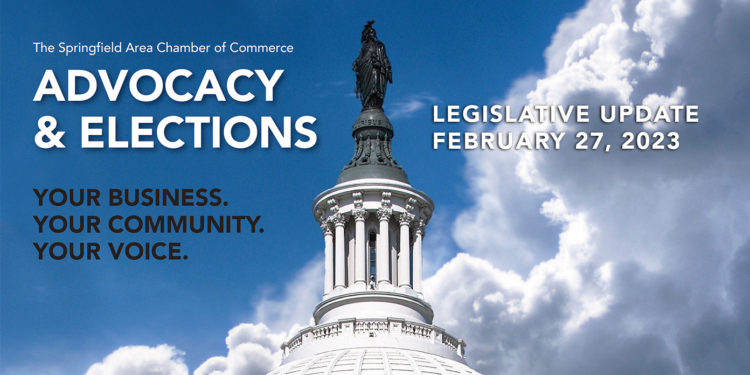Legislative Update: February 27, 2023

We’re monitoring Oregon’s 2023 legislative session for issues of impact and interest to our members. Here’s the latest update from our legislative counsel at the Oregon State Chamber of Commerce (OSCC).
The February revenue forecast was released this past Wednesday. It brought good news to lawmakers and budget writers, as the forecast showed more revenue for the upcoming 2023-25 biennium than was previously anticipated. The Governor’s recently-released budget was based on the expectation of $30.7 billion in General Fund/Lottery revenues and an overall ‘deficit’ of about $550 million.
With the February 22nd forecast, state economists are projecting $31.4 billion in General Fund/Lottery – an increase of about $700 million and more than enough to erase the $550 million deficit. There should now be enough anticipated revenue to cover proposed budgets. The concern about a pending recession has waned.
This past week was also the deadline for legislators to submit any final requests for legislation for the 2023 session. As expected, we saw a rush of new bills last week and expect to see more this week. As of Monday, there were 2,347 pieces of legislation introduced for the 2023 session to date. We expect the deadline to bring somewhere in the neighborhood of 400-500 new bills.
The next major benchmark date is March 17th, which is the first meaningful procedural scheduling deadline. Any bill not scheduled for a committee ‘work session’ by this date is considered dead.
The major legislative development for the upcoming week includes the prospect for passage of the first two major bipartisan packages. The housing package will be contained in House Bill 2001. It will include Governor Kotek’s request for $130 million in funds to build 600 shelter beds, preserve housing for 9,000 families, and help create shelter for 1,200 homeless Oregonians. Overall, the package is expected to invest around $200 million in housing and create a pathway for the goal of constructing a target of 36,000 new housing units per year.
The second potential major legislative package includes Senate Bill 4 – the incentive package for the semiconductor industry. This package is also expected to include $200 million in incentives, including forgivable loans. The most controversial part of the package, to date, would allow the Governor to make an executive decision to pull land into an urban growth boundary for a limited time to increase land supply for building manufacturing facilities.
Where OSCC is optimistic
We continue to be optimistic that there will be a meaningful bipartisan effort to exempt more small businesses from filing for and being subject to the CAT tax. OSCC testified in support of both HB 2433 and SB 127 over the past weeks, and OSCC has made this its top legislative priority to date.
As further evidence of the legislature’s seriousness about this issue, there will be additional discussions on this topic in the House Revenue Committee this week.
Where OSCC has serious concern
Right now, we continue to have major concerns with the environmental regulatory bills we are seeing considered in the House Committee on Climate, Energy and Environment.
We’ve already documented our concerns regarding HB 2396 – a job-killing bill that would authorize DEQ to create an “indirect source” review program that would regulate projects that promote vehicle traffic or require off-road engines – and HB 3158, which would create a slew of new taxes and fees to fund an incentive program for non-road diesel vehicles. Among other things, the bill puts a new tax on tires and on the purchase and rental of diesel equipment. OSCC opposed HB 2396 and also opposed HB 3158.
But we are also seeing other bills this week that are real cause for concern, including:
HB 3152, which in essence begins the process of a statewide ban on the use of natural gas in the residential housing sector.
HB 3229 is a major DEQ fee increase on manufacturing facilities for the Title V air emissions program. The proposed fee increase is 80% and purports to save the positions of DEQ regulators at the expense of manufacturing companies throughout the state.
HB 3196 is of real concern, as it authorizes DEQ to collect fees from regulated entities to defray the “costs to the department of administering and overseeing those portions of the climate protection program related to community climate investments.” This is a concern because there is an ongoing lawsuit against the DEQ’s costly “Cap and Reduce” program that is being challenged on grounds that it had no legal authorization. HB 3196 creates concern that the program could, in effect, be authorized retroactively and make any legal challenges moot.
OSCC ACTION ALERT
SB 795 is a good piece of legislation that would give Oregon’s timber counties a right to chart their own economic future and no longer be subject to the restrictive environmental policies of the Department of Forestry that are choking the economic life from these 16 counties.
In short, SB 795 would return state forest lands – that are currently held in trust for the counties – back to the counties to be managed by local government for greatest permanent value. View the Action Alert here.
The record will be open until close of business Tuesday evening. Submit your testimony here.
A public hearing on SB 795 was held on the morning of Monday, February 27, in the Senate Committee on Natural Resources.
The Springfield Chamber of Commerce will be publishing the OSCC’s legislative updates weekly, or as received. Any opinions expressed or implied are those of OSCC and do not necessarily reflect those of the Springfield Chamber or its representatives. If you’d like more information, please visit our Advocacy & Elections Page.
Discover more from Springfield Bottom Line
Subscribe to get the latest posts sent to your email.





